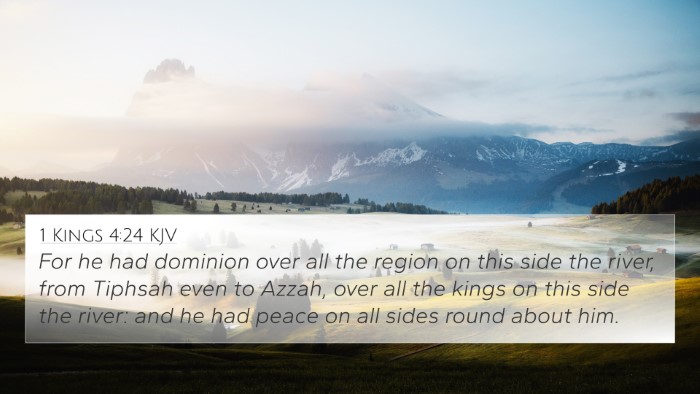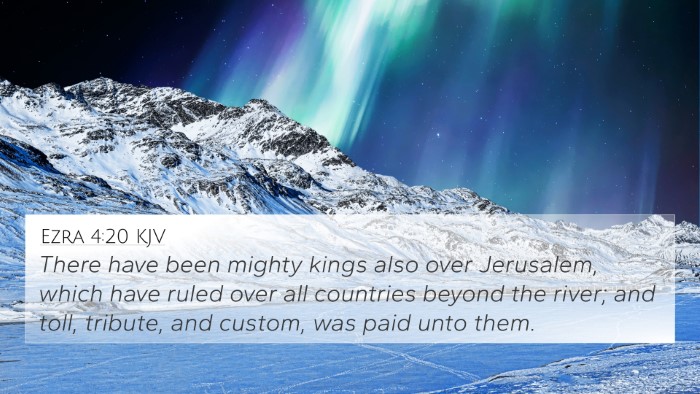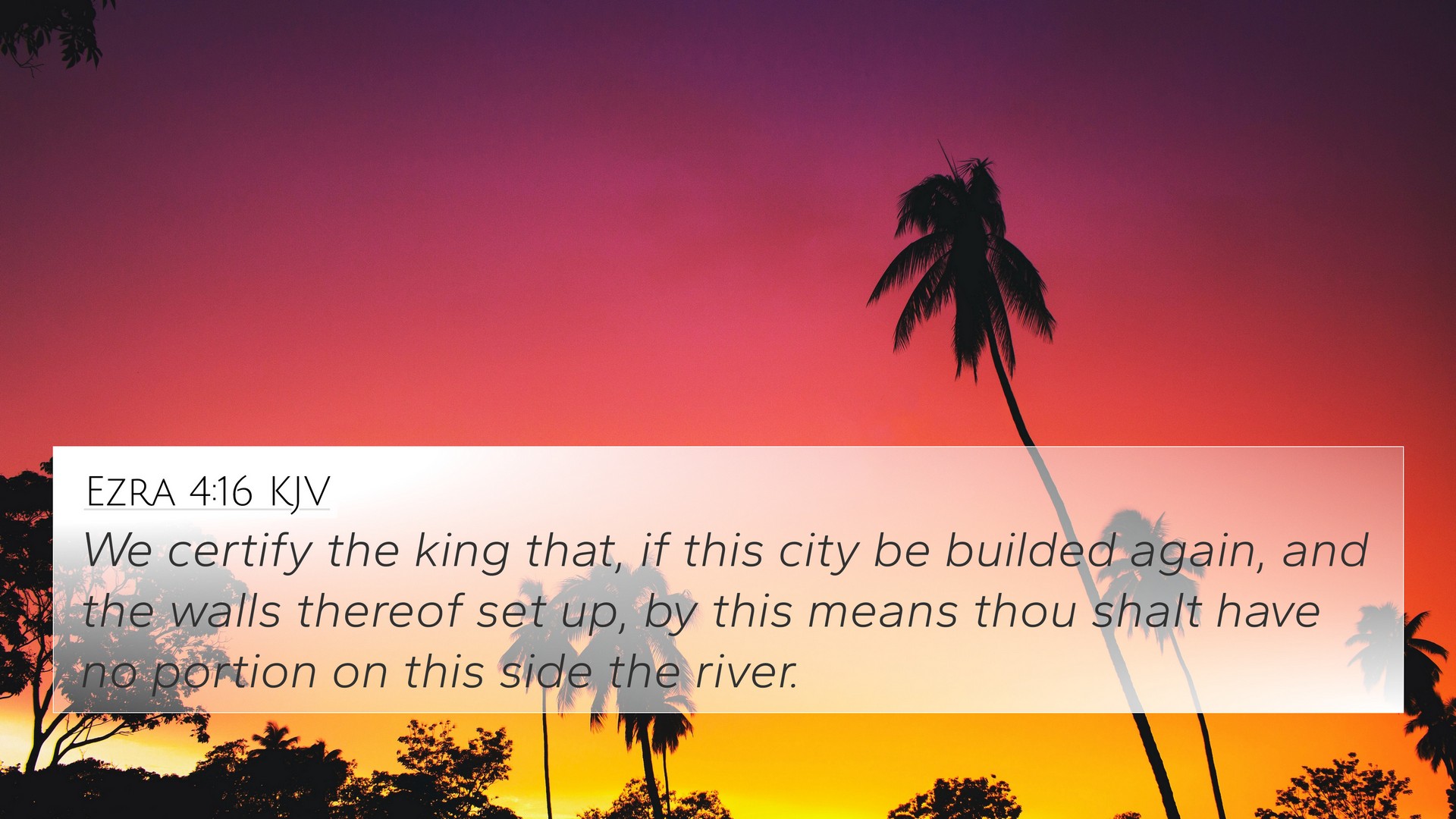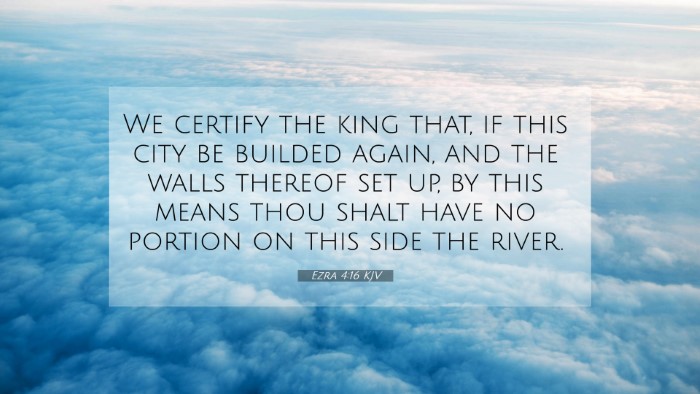Old Testament
Genesis Exodus Leviticus Numbers Deuteronomy Joshua Judges Ruth 1 Samuel 2 Samuel 1 Kings 2 Kings 1 Chronicles 2 Chronicles Ezra Nehemiah Esther Job Psalms Proverbs Ecclesiastes Song of Solomon Isaiah Jeremiah Lamentations Ezekiel Daniel Hosea Joel Amos Obadiah Jonah Micah Nahum Habakkuk Zephaniah Haggai Zechariah MalachiEzra 4:16 Similar Verses
Ezra 4:16 Cross References
We certify the king that, if this city be builded again, and the walls thereof set up, by this means thou shalt have no portion on this side the river.
Uncover the Rich Themes and Topics of This Bible Verse
Listed below are the Bible themes associated with Ezra 4:16. We invite you to explore each theme to gain deeper insights into the Scriptures.
Ezra 4:16 Cross Reference Verses
This section features a detailed cross-reference designed to enrich your understanding of the Scriptures. Below, you will find carefully selected verses that echo the themes and teachings related to Ezra 4:16 KJV. Click on any image to explore detailed analyses of related Bible verses and uncover deeper theological insights.

2 Samuel 8:3 (KJV) »
David smote also Hadadezer, the son of Rehob, king of Zobah, as he went to recover his border at the river Euphrates.

1 Kings 4:24 (KJV) »
For he had dominion over all the region on this side the river, from Tiphsah even to Azzah, over all the kings on this side the river: and he had peace on all sides round about him.

Ezra 4:20 (KJV) »
There have been mighty kings also over Jerusalem, which have ruled over all countries beyond the river; and toll, tribute, and custom, was paid unto them.
Ezra 4:16 Verse Analysis and Similar Verses
Understanding Ezra 4:16
Ezra 4:16 states: “We inform the king that if this city is built, and the walls finished, they will not pay tribute, custom, or toll, and the damage will be to the kings.” This verse captures a critical moment during the rebuilding of Jerusalem’s walls, highlighting the challenges faced by the returning exiles and the opposition they encountered.
Context and Background
The book of Ezra recounts the return of the Jewish exiles from Babylon and their efforts to rebuild the temple and the city of Jerusalem. Ezra 4 describes the increasing resistance from adversaries who sought to undermine the rebuilding efforts.
Theological Insights
This verse illustrates the political dynamics of the time, where the local officials feared the resurgence of Jerusalem as a powerful city, potentially threatening the surrounding imperial powers. It reveals how worldly politics intertwined with the divine mission of rebuilding. Several public domain commentaries provide deeper insights into this passage.
- Matthew Henry: He notes the accusations made against the Jews were grounded in their historical reputation for rebellion. Henry emphasizes that the enemies sought to manipulate the Persian authorities by highlighting the potential loss of revenue from the kingdom.
- Albert Barnes: Barnes focuses on the motivations behind the accusations, interpreting them as cowardly and self-serving. He stresses the importance of understanding that opposition often arises when undertaking significant spiritual and communal tasks.
- Adam Clarke: Clarke elaborates on the sociopolitical implications of the verse, noting that the Jews were seen as a threat to the Persian authority because of their religious fervor and commitment to reestablishing their culture and practices in Jerusalem.
Connections Between Bible Verses
Ezra 4:16 can be cross-referenced with several other scriptures, providing a broader understanding of its implications and themes.
- Nehemiah 4:1-3: This passage artfully captures the sentiments of ridicule and scorn faced by Nehemiah when rebuilding the walls, paralleling the situation in Ezra.
- Psalm 137:1: The emotional turmoil of the exiles is reflected here, showing the deep yearning for their homeland amidst opposition.
- Isaiah 41:10: Offers reassurance of God’s protection, reinforcing that despite challenges, divine assistance is assured.
- Zechariah 1:16: This verse promises restoration, linking the intentions behind the rebuilding efforts to God’s plan for Jerusalem.
- Luke 19:44: Jesus’ lament over Jerusalem echoes the city’s tumultuous history and foreshadows future events tied to its fate.
- Matthew 5:14: Reflects the significance of being a city set on a hill, symbolizing hope and resilience amidst adversity.
- Revelation 21:2: Portrays the ultimate restoration and fulfillment of God’s promises concerning the new Jerusalem.
Thematic Connections
Exploring the themes related to Ezra 4:16 helps us understand the broader narrative of restoration, resistance, and God’s sovereignty. These themes resonate throughout the scripture, linking not only the Old Testament but also the New Testament teachings.
Resistance in Rebuilding
The battle against earthly opposition during spiritual rebuilding is a common thread in biblical texts. Believers are often reminded through passages such as Nehemiah 4 that challenges serve to strengthen faith and reliance on God.
The Role of Prayer and Intercession
Throughout Ezra and Nehemiah, the power of prayer is emphasized. It serves as a vital tool for those facing opposition to seek divine intervention and strength.
Conclusion
Ezra 4:16 reminds us of the political intricacies and spiritual significance entwined in the process of rebuilding Jerusalem. By utilizing a cross-referencing approach, we gain a comprehensive understanding of the challenges and divine assurances that shaped the experience of the exiled community.
In both historical and theological contexts, this verse calls believers to recognize that while opposition is inevitable, God's purpose prevails throughout the spectrum of biblical narrative.
Additional Resources for Bible Study
For those interested in deeper explorations, consider utilizing tools such as:
- Bible Concordance
- Bible Cross-reference Guide
- Bible Chain References
- Cross-Referencing Bible Study Methods
- Comprehensive Bible Cross-Reference Materials
These resources can aid in identifying connections between Bible verses, further enhancing understanding and application of biblical teachings.


